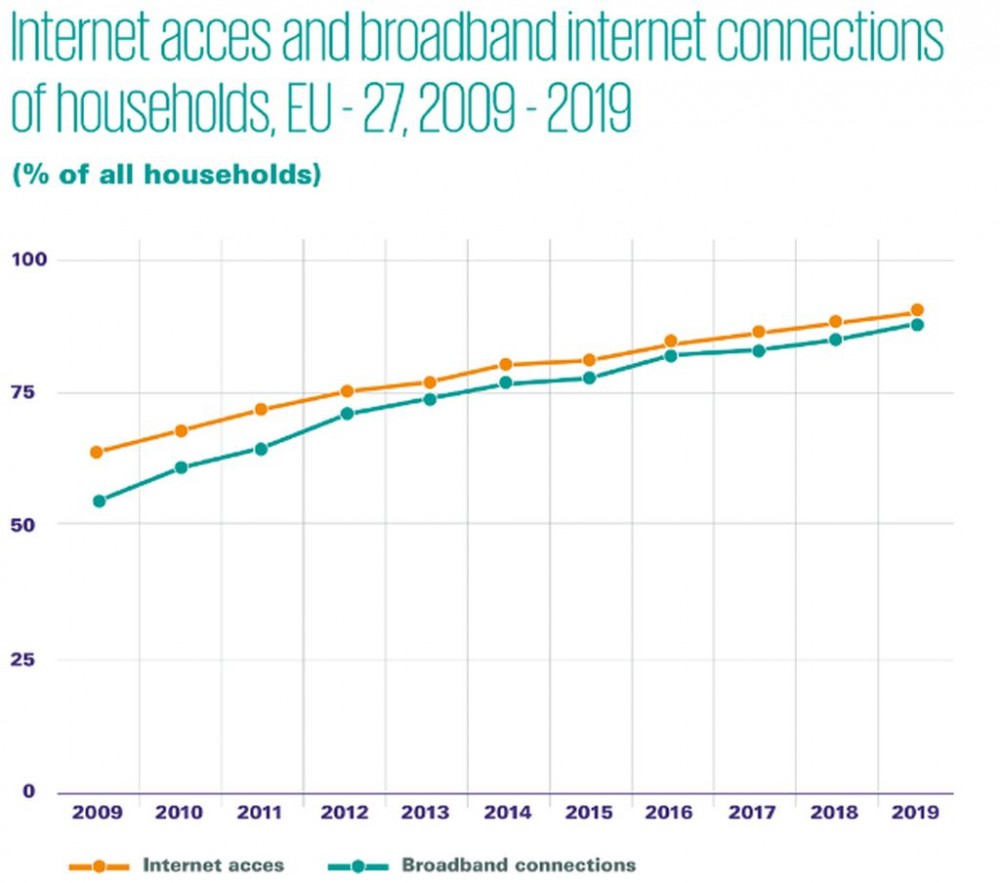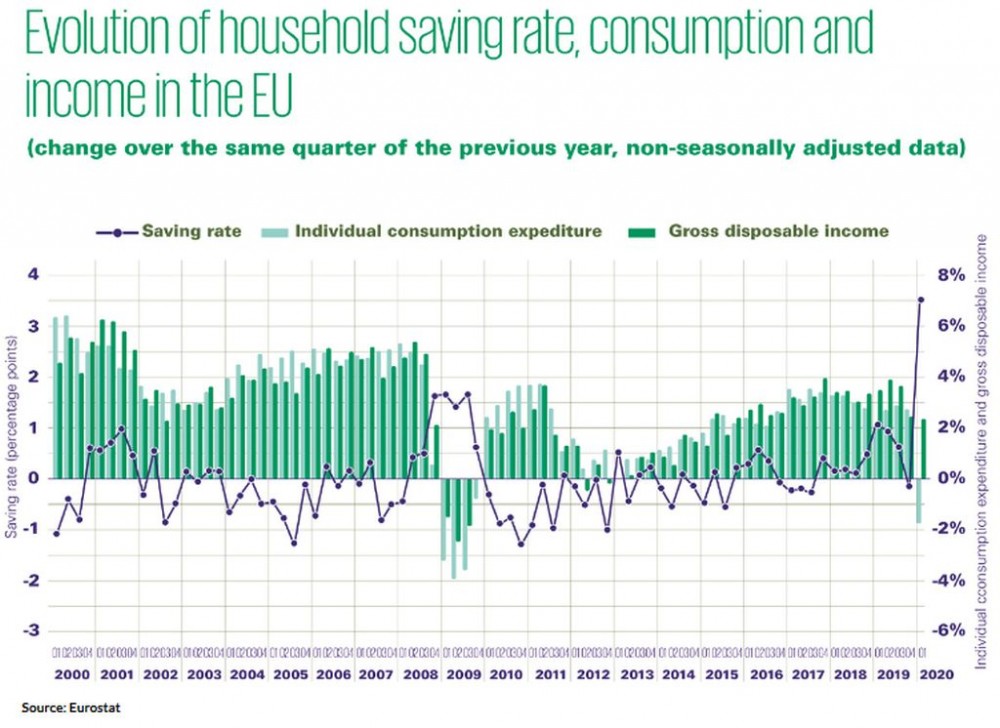ACCORDING TO THE DIGITAL ECONOMY AND SOCIETY STATISTICS RELEASED BY EUROSTAT, BY 2019, the share of EU-27 households with internet access had risen to 90%, some 26 percentage points higher than in 2009 (64%), while broadband internet access was used by 88% of the households in the EU-27 in 2019; 33 percentage points higher than in 2009.
Further, the proportion of individuals aged 16 to 74 in the EU-27 who ordered or bought goods or services over the internet for private use stood at 60% in 2019, 14 percentage points higher than in 2014.
While it is clear that there has been steady growth in online sales of goods and services throughout the last few years, the Covid-19 pandemic has accelerated this growth even more.
However, we have seen that the household saving rate in the EU recorded its all-time highest year-on-year increase in the first quarter of 2020, showing a 3.5 percentage points increase compared with the first quarter of 2019.


The main reason seems to be the year-on-year decrease in household final consumption expenditure (-1.7%), in stark contrast with its recent increases above 2%.
Under these unprecedented circumstances, with a rise in online sales and a decrease in final consumption expenditure, there is a general stringent need to move businesses into the online environment in order for them to remain relevant on the market.
However, operating an online business poses several legal challenges and companies that operate in this field must abide by all applicable laws in relation to this highly-regulated and consumer-facing area.
We will present here the most relevant Romanian legal provisions, generally derived from the EU legislative framework, that need to be observed while operating an online business.
1. MANDATORY INFORMATION TO BE PROVIDED TO CLIENTS
The first piece of legislation that needs to be brought into this discussion is the Romanian Law no. 365/2002 on electronic commerce (the E-commerce Law), which regulates the general obligations of information society services providers. Companies which market their products and services online fall under this category and they are required to provide recipients of the products or services and public authorities with means to allow easy, direct, permanent and free access to at least the following information:
a) The name of the company.
b) The headquarters of the company.
c) Contact information - telephone numbers, fax numbers, e-mail address and any other data necessary to contact the company directly and effectively.

d) The registration number or other similar means of identification, if the company is registered in the trade register or in another similar public register.
e) The tax registration code.
f) The fees related to the offered services and/or products, specifying the exemption, inclusion or non-inclusion of value added tax, as well as its amount.
g) The inclusion or non-inclusion in the price of the delivery costs, as well as their value, if applicable.
Online businesses need to display this information in a clear, visible form, and the information must be permanently available on their website. As a practical way to make this information available, it is recommended that it should be included in the terms and conditions, available on each relevant website.
In terms of language requirements, while the E-Commerce Law does not establish any conditions relating to the language in which the online business must present the information, all information targeted to consumers must be provided in the Romanian language. This does not preclude the possibility to provide information in a different language, if the company chooses to.
Further, if the online shop targets clients located in other jurisdictions, we recommend that the information should be provided to customers in an appropriate language so that the information is clear and easy to understand. Moreover, specific language requirements should be verified in each jurisdiction where customers are targeted.
2. PLACING THE ORDER AND CONCLUSION OF THE CONTRACT
According to the E-commerce Law, contracts concluded by electronic means produce all the effects that the law recognizes for contracts, when the conditions required by law for their validity are met. Moreover, for the validity of contracts concluded by electronic means, the prior consent of the parties on the use of electronic means is not required.
Before the client places the order, online businesses must provide the client with at least the following information, which must be expressed in a clear, unambiguous manner and in accessible language:
a) The technical steps to be followed in order to conclude the contract.
b) Whether or not the contract, once concluded, is stored by the seller and whether or not it is accessible.
c) The technical means that the online business makes available to the recipient for the identification and correction of errors which have occurred during data entry.
d) The language in which the contract can be concluded.
e) The relevant codes of conduct by which the online business abides, as well as information on how these codes can be consulted by electronic means.
As a practical way of delivery, it is recommended that this information should also be included in the terms and conditions, available on the website.
The general terms and conditions of the proposed contract must be made available to the recipient in a way that allows him or her to store and reproduce them. Moreover, online businesses are required to offer the recipient the opportunity to use an appropriate, effective and accessible technical procedure to identify and correct errors in data entry, prior to accepting the offer.

The moment from which the contract is considered concluded is deemed to be when the acceptance of the offer to contract (order) has been acknowledged by the seller.
Online businesses are required to confirm receipt of the offer (order) in one of the following ways:
a) By sending a proof of receipt by electronic mail or other equivalent means of individual communication, to the address indicated by the recipient, without delay.
b) By equivalent means to that used to send acceptance of the offer (order), as soon as acceptance (the order) has been received by the online business, provided by the recipient.
3. INFORMATION TO BE PROVIDED TO CONSUMERS
While the requirements presented in the first two sections above are applicable both in B2B (business-to-business) and in B2C (business-to-consumer) sales, there are certain specific requirements applicable solely in relation to B2C sales.
As such, according to the Romanian Government’s Emergency Ordinance no. 34/2014 on consumer rights in contracts concluded with professionals (Consumer Rights GEO), online businesses must provide the consumer with the following information in a clear and comprehensible manner, prior to the time when the contract takes effect:
a) The main characteristics of the products, taking into account the communication environment and the products concerned.
b) The identity of the company operating the online business, such as its trade name.
c) The postal address at which the online business is established, as well as, if any, its telephone number, fax number and e-mail address at which it can be effectively contacted.
d) If it is different from the postal address at which the online business is established, the postal address of the place where the online business carries out its activity to which the consumer can send any complaints.
e) The total price of the products with all taxes included or, if the price cannot be reasonably calculated in advance given the nature of the products, the method of calculating the price and, where applicable, all additional costs of transport, delivery, duties, postal services or costs of any other nature or, if they cannot be reasonably calculated in advance, an indication that these additional costs could be borne by the consumer, including the period of validity of the offer or prices.
f ) The methods of payment, delivery, execution, the date by which the online business undertakes to deliver the products and, as appropriate, the online business’s procedure for resolving complaints.
g) If there is a right of withdrawal, the conditions, terms and procedures for exercising that right, as well as the standard withdrawal form, contained in the annex to the Consumer Rights GEO.
h) Where applicable, information that the consumer will have to bear the cost of returning the products in case of withdrawal and, if the products, by their very nature, cannot normally be returned by post, the cost of returning the products.
i) Information according to which the consumer is required to pay to the online business reasonable costs if the consumer exercises his or her right of withdrawal.
j) If the right of withdrawal is not provided, the information according to which the consumer will not benefit from a right of withdrawal or, as appropriate, the circumstances in which the consumer loses his or her right of withdrawal.
k) A statement concerning the existence of a legal guarantee in relation to the conformity of the products to the applicable requirements.
l) Where applicable, the existence and conditions of after-sales assistance provided to the consumer, after-sales services and commercial guarantees.
m) The existence of relevant codes of conduct and the manner in which copies of them may be obtained, as appropriate.
n) The duration of the contract, as appropriate, or, if the contract is concluded for an indefinite period or is to be automatically extended, the conditions for termination of the contract, including applicable penalties, if relevant.
o) Where applicable, the minimum period of validity of the obligations incumbent on the consumer under the contract.
p) Where applicable, the possibility and the manner of having recourse to an out-of-court mechanism for the submission and settlement of complaints to which the online business is subject.
As a practical way of providing the information, it is recommended that this should also be included in the terms and conditions, available on the website of the online business, where possible.
However, the Consumer Rights GEO offers sellers the possibility to provide the information in letters g), h) and i) above using the standard withdrawal information form provided by law.
If the online business does not inform the customer about possible additional costs, or the costs related to the return of products, the consumer should not bear those costs.
Moreover, online businesses are required to present on the home page of online stores a visible link to the official web address of the National Authority for Consumer Protection (www.anpc.gov.ro).
4. WITHDRAWAL RIGHT
According to the Consumer Rights GEO, the consumer is allowed a period of 14 days to withdraw from the contract without having to justify the decision to withdraw and without incurring costs other than those detailed below.
The withdrawal period expires 14 days from:
- The day on which the consumer or a third party, other than the carrier and which is indicated by the consumer, takes physical possession of the products.
- The day on which the consumer or a third party, other than the carrier and which is indicated by the consumer,takesphysical possessionofthelastproduct,iftheconsumerordersbyasingleordermultiple products which are delivered separately.
- The day on which the consumer or a third party, other than the carrier and indicated by the consumer, takes physical possession of the first product, in the case of contracts for the periodic delivery of products for a specified period of time.
During the withdrawal period, the parties must fulfil their contractual obligations.
If the right of withdrawal is applicable, and if the online business does not inform the consumer about the conditions, deadlines and procedures for exercising this right, as well as about the standard form, the withdrawal period expires 12 months after the end the initial withdrawal period of 14 days.
If the online business has provided this information within 12 months of the date on which the withdrawal period is calculated, the withdrawal period will expire within 14 days of the date on which the consumer receives that information.
The provisions of the Consumer Rights GEO allow online businesses to give the consumer the option to complete and submit in electronic format, in the online stores, either the model withdrawal form provided by the Consumer Rights GEO or an unequivocal statement of any other type. In these situations, online businesses must communicate without delay, on a durable medium, the confirmation of receipt of the withdrawal form.
Based on the provisions of Art. 13 of the Consumer Rights GEO, in the case of withdrawal, online businesses are required to reimburse all amounts received as payment from the consumer, including, where applicable, delivery costs, without undue delay, but not later than 14 days from the date on which they are informed of the withdrawal decision. Reimbursement must be made using the same payment methods as those used by the consumer for the initial transaction, unless the consumer has agreed to another payment method and provided that he or she is not responsible for the payment of fees following the refund.
However, in the event that the consumer has explicitly chosen a different type of delivery than the standard delivery offered by the professional, online businesses are not required to reimburse the additional costs.
Online businesses must bear the costs related to the return of the products if they have not informed the consumer that these costs are borne by the consumer or if the online business has chosen to bear these costs.
5. ONLINE INTERMEDIATIONS SERVICES (PLATFORMS)
The EU Regulation on platform-to-business relations (P2B regulation), which became applicable in July 2020, is the first-ever set of rules creating a fair, transparent and predictable business environment for smaller businesses and traders on online platforms.
The P2B regulation contains rules for online intermediation services (online platforms) and online search engines that aim to connect EU businesses and professional websites with EU consumers, in order to limit unfair commercial practices. Verification of the fulfilment of the obligations imposed by the P2B regulation is carried out by the Competition Council.
The relationship of the platform providers with the companies using online intermediation services (professional users) will be regulated contractually, through the terms and conditions (or a similar document).
To fulfil the obligations imposed by the P2B regulation, online platform providers must:
- Ensurethattheirtermsandconditionsforprofessionalusersareeasytounderstandandeasyto find.
- Specifyinadvancethepossiblereasonsforrestricting, suspending or terminating their services.
- Notifytheirprofessionalusersatleast15daysbeforeanychangeintheirtermsandconditions,unlesstheyaresubjecttoaspecificlegalobligationor to address unforeseen and imminent cybersecurity risks-failuretocomplywiththisobligationwouldmean that any changes are void.
- Act in good faith, by refraining from implementing retroactivechangestothetermsandconditions,offeringarightofterminationtotheirprofessionalusersandstatingwhethertheymaintainaccesstoprofessionalusers’dataaftertheterminationoftheir contract.
- Explainwhethertheyreserveanyrightswithrespecttotheintellectualpropertyoftheirprofessionalusersorintermsoftheplatform’sabilitytomarketthegoodsorservicesoftheirprofessional users outside the relevant platform.
- Provideprofessionaluserswithadetailedstatementofthereasonsfortherestriction,suspensionorterminationoftheirservices-inthecase of general termination, this statement must be provided 30 days in advance.
- Ensurethattheidentityoftheirprofessionalusers is clearly visible.
The terms and conditions must include:
- Themainparametersthatdeterminetheirrankingandtheirrelativeimportanceinrelationtoallotherparameters-thisdescriptionincludesanypossibility to influence the ranking against direct or indirectremuneration(inadditiontoonlineplatforms, online search engines must also determine the main parameters that determine the ranking).
- Whereapplicable,adescriptionofanyancillarygoods or services that the online platform may offer itself as a complement to the goods or services of its professional users.
- Adescriptionofanydifferentialtreatmentgiventothegoodsandservicestheplatformownersprovide themselves (or goods and services provided by the professional users they control), compared to thetreatmenttheygivetothegoodsandservicesprovidedbyotherprofessionalusers.(Thisrequirementappliessimilarlytoonlinesearchengines).
- Adescriptionofthetechnicalandcontractualaccessofprofessionaluserstopersonalorotherdatathatbusinessusersorconsumersprovidetoonline intermediation services or that are generated through the use of these services.
- Whereapplicable,thelegal,economicorcommercial consideration for any restriction on the ability of professional users to provide their goods or services on different terms through other channels.
- Informationontheaccessandoperationoftheinternalcomplaintsmanagementsystem,aswellasone or more mediators that business users can turn toinordertotrytoresolveanydisputeswiththerelevant provider of the online platform.
The obligations described above, as well as the P2B regulation as a whole, apply to online intermediation services and online search engines offered for supply to traders, whether individuals or legal entities, established or resident in the European Union, and offering goods or services within the Union to individual consumers.
As described above, operating an online business can pose significant legal challenges and complying with all applicable laws in this area can be particularly difficult, especially when the need to move your business online arises overnight. Appropriate legal advice should be sought in all cases, particularly in relation to the information that needs to be provided to consumers, as well as in relation to the regulation applicable to online intermediation platforms, which is still new and rather uncharted territory.
You can read the article also in the document below:


































